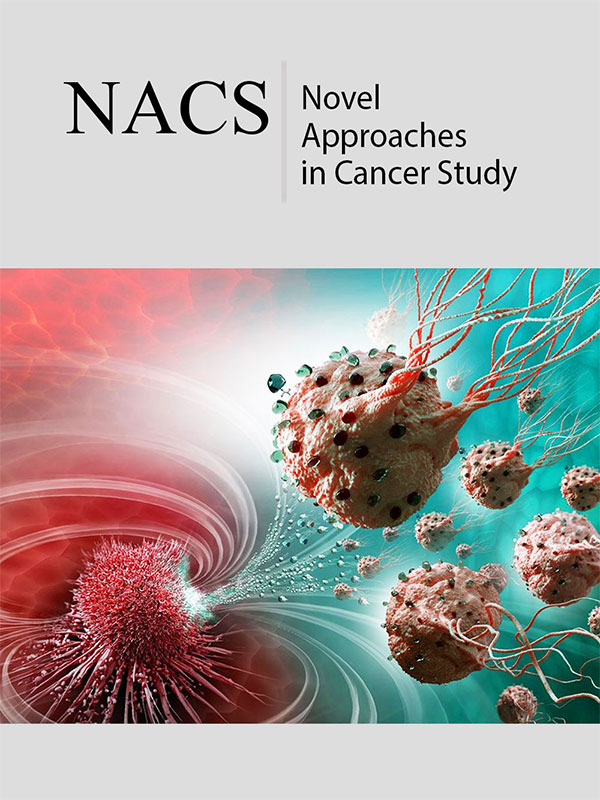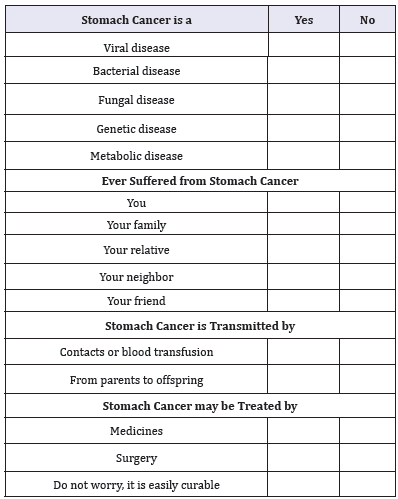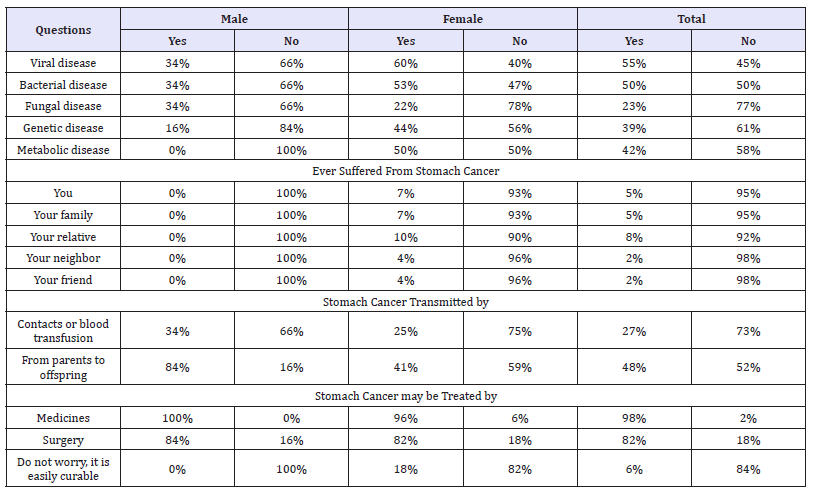- Submissions

Full Text
Novel Approaches in Cancer Study
Awareness about Stomach Cancer in Biotechnology Students
Muhammad Imran Qadir* and Iqra Jamshaid
Institute of Molecular Biology & Biotechnology, Bahauddin Zakariya University, Pakistan
*Corresponding author:Muhammad Imran Qadir, Institute of Molecular biology & Biotechnology, Bahauddin Zakariya Univesity, Multan, Pakistan
Submission: April 12, 2018;Published: June 08, 2018

ISSN:2637-773XVolume1 Issue4
Abstract
Stomach cancer is caused by mutation in CDH1 gene which is involved in the normal function of E-cadherin this gene sends signals to other cells thus regulate the function of other genes. To check the awareness of stomach cancer among post graduate students a questionnaire was developed. This was concluded that the post graduate students were somehow aware with this disease.
keywords: Stomach cancer; Mutation; Cdh1 gene; Function; Expression
Introduction
Stomach is the vital organ that helps in digestion of food. Any problem being occurred in stomach directly affects whole of digestive system. Now days, stomach cancer is being most common among the population. Stomach cancer also called gastric cancer. It is a type of cancer that starts to develop from stomach lining. When cells begin to produce in abnormal form the cancer starts to develop. Cells in any part of the body become cancer and can spread other part of the body. Stomach cancer starts in the stomach mostly the inner lining of stomach and slowly grows into other layers [1]. The causes of stomach cancer are helicobacter pylori infection, smoking and environment factors. Mostly the stomach cancer is cause by mutation in the CDH1 gene. CDH1 is involved in making the protein called epithelial cadherin or E-cadherin. It has also role in transmitting signals between the cells and regulating activity of certain genes [2]. The basic purpose of this study was to provide the awareness of university students about the disease.
Methodology
This questionnaire was developed to check the awareness of students about the stomach cancer. 39 students was selected from BZU, the inclusion criteria was M.phil students and exclusion criteria was that they were not the students of BS Table 1.
Table 1:Questionnaire to evaluate awareness about etiology of stomach cancer.

Results and Discussion
In Korea gastric cancer screening is used as the national screening program for gastric cancer which have no affect on economic. This study has some limitations. First, that the eradication of Helicobacter pylori is important. Second the survey did not asses that what the causes of stomach cancer. Third, statistical are significant due to small number of gastric cancer screening. Fourth, the design of study is cross sectional we have no information regarding the gastric cancer screening. Fifth, only 70.2% selected member of a family respond to the health examination survey other 29.8% of the member did not participate in the survey [3]. Awareness about etiology of stomach cancer was given in Table 2 that show 55% of male and female student called that stomach cancer is a viral disease and 45% called it is not a viral disease, 50% male and female called that it is a bacterial disease while rest 50% called it is not a bacterial disease, 23% male and female called it a fungal disease and rest 77% called it is not a fungal disease, 39% male and female called that it is genetic disease while 61% called it is not a genetic disease, 42% male and female called that it is metabolic disease while rest 58% called it is not a metabolic disease.
Table 2: Awareness about etiology of stomach cancer: Views of Postgraduate Biology Students.

Conclusion
This was concluded that the post graduate students somehow aware about disease. While in Korea mostly people did not respond to the survey about screening of gastric cancer.
References
- Hartgrink, Henk H, Edwin PMJ, Nicole CTG, Cornelis JH, et al. (2009) Gastric cancer. The Lancet 374: 477-490
- González CA, López-Carrillo L (2010) Helicobacter pylori, nutrition and smoking interactions: their impact in gastric carcinogenesis, Scand J Gastroentero 45(1): 6-14.
- Kang JM, Shin DW, Kwon YM, Park SM, Park MS (2011) Stomach cancer screening and preventive behaviors in relatives of gastric cancer patients. World J Gastroenterol 17(30): 3518-3525.
© 2018 Muhammad Imran Qadir. This is an open access article distributed under the terms of the Creative Commons Attribution License , which permits unrestricted use, distribution, and build upon your work non-commercially.
 a Creative Commons Attribution 4.0 International License. Based on a work at www.crimsonpublishers.com.
Best viewed in
a Creative Commons Attribution 4.0 International License. Based on a work at www.crimsonpublishers.com.
Best viewed in 







.jpg)






























 Editorial Board Registrations
Editorial Board Registrations Submit your Article
Submit your Article Refer a Friend
Refer a Friend Advertise With Us
Advertise With Us
.jpg)






.jpg)













.bmp)
.jpg)
.png)
.jpg)














.png)

.png)



.png)






